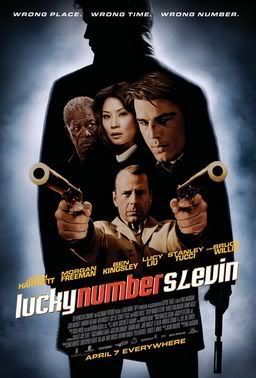Dir: Paul McGuigan
Tagline: Wrong Time. Wrong Place. Wrong Number.
Rating: ** out of 5 stars

For the Diamondback....
Love him or hate him, there is no denying that director Quentin Tarantino has inspired dozens of copycat films. Paul McGuigan’s pulp noir Lucky Number Slevin is the latest QT wannabe, with a touch of Hitchcock influence.
Pulling pages right from the Book of Tarantino, McGuigan presents a convoluted story laced with gratuitous violence and pop culture references. But unlike Reservoir Dogs’ quirky discussion of Madonna’s “Like A Virgin”, the dialogue in Slevin is forced and often meaningless. Although it oozes an “I’m-So-Clever” complacency, the script is not as witty as it thinks.
The story begins with a horse. In a flashback told by Smith (Bruce Willis), a series of events involving a rigged horserace culminates in murder. This bloody prologue, although disconnected from the central plot, gives the film a good start. Then we are introduced to Slevin, portrayed by the barely-clad Josh Hartnett (Sin City), who is housesitting for his friend Nick Fisher. Here begins the film’s descent into absurdity.
Slevin, who spends half the movie in nothing but a towel, is repeatedly mistaken for Nick. First, Slevin is taken to a gangster known as the Boss (Morgan Freeman, Batman Begins), to whom Nick owes $96,000. Unable to convince anyone that he is not Nick, Slevin must pay off the debt by doing the Boss a favor – killing the son of rival gangster, the Rabbi (Sir Ben Kingsley, Oliver Twist).
Soon thereafter, he is picked up by Hasidic thugs and taken to see the Rabbi, to whom Nick also owes money. If Slevin does not pay up, cement shoes will surely factor into his future. While Slevin tries to figure a way out of his predicament, we learn that Smith, who is actually an assassin named Goodkat, is pulling the strings and using the two crime lords to frame or kill Slevin – his intentions are not clear.
Meanwhile, Nick’s spunky neighbor Lindsey (Lucy Liu, Kill Bill: Volume 1) plays junior sleuth and tails Goodkat. She and Slevin develop an attraction as they attempt to fulfill the Boss’s order and also pay off the Rabbi. Not helping matters is a nosey detective, played by Stanley Tucci (The Terminal), who shadows their every move.
Slevin draws upon classic Alfred Hitchcock films, including the mistaken-identity thriller North by Northwest - which the Rabbi makes reference to in one of the film’s attempts at quirkiness – and Rear Window, which also featured a spunky girl playing detective for the hero. But unlike its influences, Slevin throws out tension in exchange for black comedy that is ultimately more annoying than funny.
Hartnett, although moderately charming, still struggles to rise above that “Well, at least he’s not Ben Affleck” likeability. Slevin’s smartass one-liners are no substitute for the sharp wit expected of a noir hero. As the villains, Freeman and Kingsley provide the heaviest acting, but sometimes go over-the-top. Willis’ hitman is the most intriguing villain but he is unfortunately relegated to a second-rate character. Meanwhile, Lucy Liu teeters dangerously on the line between cute and obnoxious.
McGuigan, who previously helmed 2004’s Wicker Park, provides stylish direction but the film cannot decide if it wants to be a black comedy or a heavy revenge drama. The shifts in tone are anything but subtle and leave the viewer confused.
Most of film’s faults lie with Jason Smilovic’s script. The dialogue goes beyond the realm of tongue-in-cheek, becoming cheesy and excessive. The film actually could have been improved had the characters never talked. The attempts at Tarantinoesque pop culture references are so forced that it hurts to watch, like when Lindsey and Slevin have a pointless discussion about James Bond.
Then Smilovic tries to win the audience over with the inevitable twist ending. There are two problems with this: 1) if you pay even mild attention, you can guess the ending thirty minutes early; 2) between flashbacks and jump scenes, the “twist” takes a ridiculous amount of time to reveal. As the film recalled each excruciating detail, I couldn’t help but envision Monty Python screaming, “Get on with it!”
Lucky Number Slevin is just not exciting enough for action fans, nor is it smart enough for more critical viewers. As much as the film emulates their work, it lacks the tension of Hitchcock and the cool of Tarantino. The movie is fortunate to have McGuigan, a director with the potential to make a solid noir, but between the ridiculous dialogue and the feeble twist ending, Slevin pushes its luck.
2 comments:
I'm actually really curious as to how you pick which movies to cite with actors names. I've wondered this for years reading movie reviews because it's quite often not the obvious choice, like Ghandi for Kingsley for example in this review, but it's not only you, so I'm wondering if there's some sort of accepted criteria for it.
Alex
LOL, really funny you should mention that...
I personally think of my audience when I choose films to cite. I originally chose "Schindler's List" when I wrote this review, since 'Ghandi' isn't that well-known among college students. Although 'List' is kind of old, it's better known.
Well then my editors changed it to 'Oliver Twist' - no idea why, who the fuck has seen that?
The review on here isn't edited by them, but I did leave the Batman Begins and Oliver Twist citations. I dunno why, I usually don't include ANY of my editors' changes, but I guess I succumbed on this one and figured they made the better choices.
As for Batman Begins, I originally cited Shawshank simply b/c Freeman is BARELY in Batman Begins, so I picked a leading role. But of course, the editors changed it. I can't win with those people.
Post a Comment